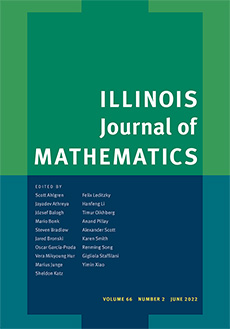Abstract
We derive explicit upper bounds for various counting functions for primes in arithmetic progressions. By way of example, if $q$ and $a$ are integers with $\mathop{\mathrm{gcd}}\nolimits (a,q)=1$ and $3\leq q\leq10^{5}$, and $\theta(x;q,a)$ denotes the sum of the logarithms of the primes $p\equiv a\ (\operatorname{mod}q)$ with $p\leq x$, we show that
\[\vert \theta(x;q,a)-{x}/{\varphi(q)}\vert <\frac{1}{160}\frac{x}{\log x}\] for all $x\geq8\cdot10^{9}$, with significantly sharper constants obtained for individual moduli $q$. We establish inequalities of the same shape for the other standard prime-counting functions $\pi(x;q,a)$ and $\psi(x;q,a)$, as well as inequalities for the $n$th prime congruent to $a\ (\operatorname{mod}q)$ when $q\le1200$. For moduli $q>10^{5}$, we find even stronger explicit inequalities, but only for much larger values of $x$. Along the way, we also derive an improved explicit lower bound for $L(1,\chi)$ for quadratic characters $\chi$, and an improved explicit upper bound for exceptional zeros.
Citation
Michael A. Bennett. Greg Martin. Kevin O’Bryant. Andrew Rechnitzer. "Explicit bounds for primes in arithmetic progressions." Illinois J. Math. 62 (1-4) 427 - 532, 2018. https://doi.org/10.1215/ijm/1552442669
Information





